- The Gatlin Brothers at Brown Country Music Center
- Kris Kristofferson passes away at 88
- The Magic Summer Tour: A Night of Nostalgia and New Memories
- Vlad Holiday at ACLfest 24: A Sonic Journey Through Indie Landscapes
- Cage The Elephant’s Resilience and Triumph at Noblesville Indiana: Review and Photos
- Lionel Richie and Earth, Wind, and Fire in Louisville: A review and photos
Donald “Duck” Dunn, King of the Electric Bass: Gone a Year
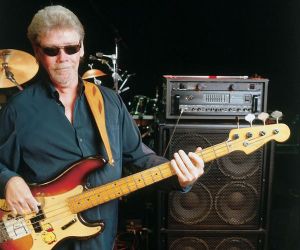 One of the bands I play in covers classic rock on the bar band circuit. Recently I tried (unsuccessfully) to convince my bandmates to cover Eric Clapton’s 1985 hit “Forever Man.” It just didn’t strike them as a suitable cover for us. Fair enough. As for me, I couldn’t get enough of the tune and would blast it constantly in the car, marvelling at the intensity of the memorable guitar solo and gravely timbre of Clapton’s weathered voice. But another integral piece of this tune really got to me every time I put it on: the groove. The bass line is very classic rhythm and blues, with that funky I-V movement that really propels the song forward. The tone is fat and ballsy, yet rounded out in a style uncharacteristic of the usually trebly, active bass tones of that era in music. I remember the song when it was on the radio back then. Dunn’s tone was the antithesis of the all-too-popular ‘80s synth bass, and it helped preserve Clapton’s signature rootsy sound in a cloudy time of keyboards and parachute pants.
One of the bands I play in covers classic rock on the bar band circuit. Recently I tried (unsuccessfully) to convince my bandmates to cover Eric Clapton’s 1985 hit “Forever Man.” It just didn’t strike them as a suitable cover for us. Fair enough. As for me, I couldn’t get enough of the tune and would blast it constantly in the car, marvelling at the intensity of the memorable guitar solo and gravely timbre of Clapton’s weathered voice. But another integral piece of this tune really got to me every time I put it on: the groove. The bass line is very classic rhythm and blues, with that funky I-V movement that really propels the song forward. The tone is fat and ballsy, yet rounded out in a style uncharacteristic of the usually trebly, active bass tones of that era in music. I remember the song when it was on the radio back then. Dunn’s tone was the antithesis of the all-too-popular ‘80s synth bass, and it helped preserve Clapton’s signature rootsy sound in a cloudy time of keyboards and parachute pants.
Of course a quick look at the song’s musician credits will reveal that the player is the legendary Donald “Duck” Dunn. In the official 1985 video for the song he is featured prominently, sporting a beard and trench coat with his well-worn Fender Precision firmly planted on the upper part of his husky frame as he mimics the groove from the record. In his mid-40s at the time, Dunn had already amassed an impressive discography and live playing resume. By this time he had recorded and/or performed with Eric Clapton, Elvis, Neil Young, Rod Stewart, John Prine, Joe Cocker, Tom Petty, Stevie Nicks, Bill Withers, and on and on.
Dunn died a year ago on May 13, 2012 at the age of 71, having fulfilled a very fruitful and successful music career. Getting his start at the now-famous Stax Records in Memphis in 1964 with Booker T. and the MGs, Dunn played on countless soul hits in the ‘60s. From Wilson Pickett’s “Midnight Hour” to Otis Redding’s “Sitting on the Dock of a Bay,” that’s Dunn laying down the bottom end. You have to remember at this time that the electric bass was a fairly new invention. It had been on the market for a brief 12 years or so when Duck joined the MGs, but he quickly put it on the map as a weapon that wielded low-end potency in a way that rivalled the power of the electric guitar. Watching him in footage from this era, it is riveting to see the confidence and exuberance with which he plays the bass. Head nodding, legs moving, and hair flying, it all reflected the dead seriousness he had about his craft. He took the bass out of the background and injected it right up front as a force that could really provide a song with intensity and punch.
[youtube id=”NfdPNMaBWI0″ width=”620″ height=”360″]
Things changed in the world of the electric bass in the mid ‘60s after Duck came along. Motown’s rhythm section started to push a little harder, and British bassists such as The Who’s John Entwistle and Cream’s Jack Bruce began to assert themselves with stinging lead lines and solos right alongside the blooming, overdriven guitars. Later in the ‘60s we hear Duck’s influence in both Rick Danko’s funky lines and the progressive, prominent style of Led Zeppelin’s John Paul Jones.
Dunn’s live work spans decades. He played Monterey with Otis Redding in 1967 and Live Aid with Eric Clapton in 1985. I saw him with CSNY in Toronto in 2000. He remained in-demand right up until his death yesterday morning in Tokyo. According to his friend and longtime collaborator, Steve Cropper, Dunn died in his sleep after doing a double gig at the Blue Note club in Toyko. He was 70 years old. He was doing what he loved right up until the end, a fate not many achieve.
Inducted with the MG’s into the Rock and Roll Hall of Fame in 1992, Dunn also received a lifetime achievement Grammy in 2007 for his influential and groundbreaking bass work. Dunn’s death is a reminder that we must remember to honour not only the big stars of music when they pass away, but we must also honour those in supporting roles who make their mark and change the musical landscape in more subtle, yet immeasurable ways. Donald “Duck” Dunn has put his stamp on the bottom end of rock and roll; his is a style forever singed into the sensibility of the electric bass as we know it today.



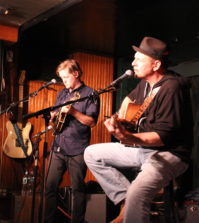
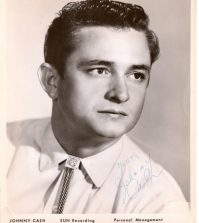


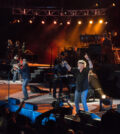
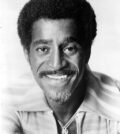








One Comment